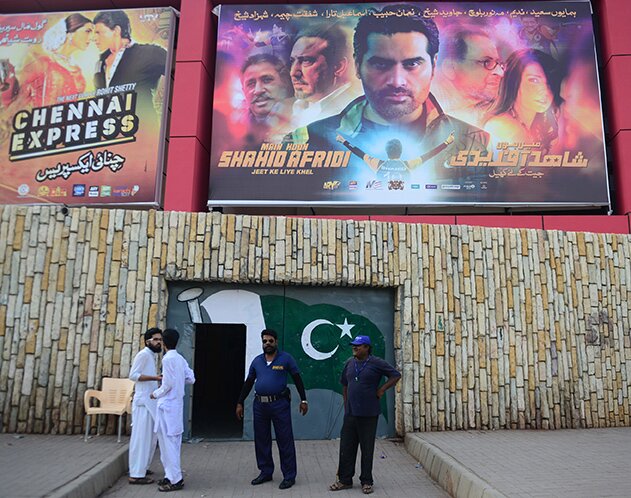By A Rahim Khan –
Film in Pakistan isn’t dead or dying, it has the onset of rigor mortis, neither exploring nor evolving
2012 saw the release of the Indonesian penkat silat action film The Raid. It was made by an unknown filmmaker, starring an unknown cast from a film industry unknown to most out of its own bailiwick and was made for the very modest sum of $1.1 million (compared to your usual $150 million tentpole Hollywood film, $1 million is barely even the catering).
The year 2004 saw the release of the American sci-fi film Primer, directed by a practical nobody, starring friends and family and was made for the downright penurious sum of $7,000 (in Hollywood that’s about enough to keep the A-lister’s trailer stocked with jelly beans). The Blairwitch Project hit cinemas in 1998, coming as a bolt from blue put together by a team of first timers in 8 days for the Spartan amount of $25,000 (probably enough to fulfill the infamous ‘riders’ of many a starlet).
All together, these three films, each half a decade apart, were, if math serves us correct, made for a total of $1.4 million and keeping with the Hollywood jibes, that’s a measly percent of the budget spent on 2007’s Transformers ($150 million) and just about as much that was spent on our very own actioner Waar ($1.6 million).
Film critic Roger Ebert wrote of The Blairwitch Project that it was “an extraordinarily effective horror film”, awarding it 4 stars. The film itself went on to gross nearly $248 million worldwide and while not the first found footage film, it certainly provided the necessary impetus to spawn an entire genre. Primer, that wunderkind of production budgets was hailed as “the freshest thing the genre(sci-fi) has seen since 2001(A Space Odyssey) “, launched its director’s career and even garnered Hollywood’s big cheese Steven Spielberg’s attention, who signed on to produce the director’s next film. The Raid blew whatever competition it may have had that year out of the water, was resoundingly declared as not only one of the best films of the year but also one of the “best action movies in decades” and led to a sequel and even an upcoming Hollywood remake (ukh).
Not bad for $1.4 million. But this is not about the cents, the dollars or the bottom line. This is a testament to the filmmakers in question and a lesson, a very petinent one for our own.
Shane Carruth, Primer’s director, also served as its writer, producer, editor and composer and if wearing all these hats wasn’t enough, he was also one of the leads in the film. Primer was his first film, indeed his first creative endeavor as before jumping headlong into the world of cinema, Carruth was a software developer and had studied math at university. The budget for the film was laughable, the one man crew and his actors certifiably green and the script elliptical. Everything was inherently wrong with this picture.
But Carruth and Primer made waves. The film, despite its seeming shortcomings and handicaps, delivered instant cult gold and proved that good film, relevant film has little time for excuses.
Unfortunately, Pakistani filmmakers are full of them. A couple of years ago, actor and director Adnan Malik put up a documentary, The Forgotten Song that was a post mortem of the Pakistani film industry. Attempts to make sense of this drivel may leave you a little worse for wear for throughout its 90 minutes we have the kind of finger pointing that would make our parliament proud. In this mess, we have one industry muck amuck after another blame everyone under the sun and their mothers for the demise of Pakistani film yet despite their oodles of self-professed talent, neither have put up a decent picture between the lot of them.
To anyone who will lend an ear, Pakistani filmmakers will ramble on about how there is no infrastructure to support the industry, how the government is aloof to their cause, how society condemns it and how their coffers are completely empty. Yes, the cards are certainly stacked up against them.
It would certainly be trite to resort to idiom here, go on about pluck and ‘where there’s a will, there’s a way’ but if one’s preamble wasn’t enough to illustrate the point, perhaps looking to our neighbors will. And no not India.
Iran. Having a cinematic tradition well in place before the Islamic Revolution, it would have seemed that film would have been first on the chopping block afterwards, but despite state censure and a world athwart, Iranian cinema is perhaps one of the most sophisticated in the comity and its filmmakers, from Kiarostami to Farhadi are celebrated worldwide. Iranian cinema has won practically every film award to be had and because of the appeal of its aesthetic has had its directors work on international projects like Certified Copy (2010) and The Past (2013).
And it hasn’t been easy for the filmmaking fraternity of the country, with directors like Jafar Panahi being arrested and banned from making movies. But even with an impending jail sentence, he managed to make a documentary about his house arrest, This is Not a Film (2011) and even got it smuggled out of the country to be screened at that year’s Cannes. One doesn’t see any of our filmmakers languishing in some gaol.
For all the fanfare and media hubbub that local films in recent years may have generated, and these are the big films we’re talking about, Bol, Khuda Kay Liay, Waar etc, they left little to no impression abroad – being screened in Ilford or Slough doesn’t count. More low budget, art house films like Slackistan, Zinda Bhaag and Josh have gone very quietly into the night, leaving the itch unscratched.
Of course there is the curious case of Sharmeen Obaid Chinoy’s Oscar winning documentary, Saving Face for not only did it prove that the Academy is run by a bunch of ninnies it also bears the white man’s burden, seeking to correct past wrongs. While everyone was caught up in the throes of white approval, they actually forgot to watch the movie itself which would have revealed an unremarkable, hackneyed feature that could never hold a candle to actual documentary greats, directors or films.
The subject matter of our films, as an idee fixee, hopelessly panders, playing up the tropes that have now become our calling cards telling the world that this here Pakistan is a land of extremism (Khuda Kay Liay) religion gone bad (Bol), even more extremism (Waar), child marriages (Dukhtar), gender inequality (Josh) and so on. These films certainly have a point but then they are so poorly told that Cinema Verite groans on the inside.
Film in Pakistan isn’t dead or dying, it has the onset of rigor mortis, neither exploring nor evolving. Our filmmakers are chary of doing anything out of the ordinary for while uncertainty is a wholly Pakistani quality it is bad for business.
That is why a slew of new releases will flog the proverbial dead horse and we’ll see spy thriller Operation 021 and a sequel to Waar, which its producers (if they’re not on the lamb) bashfully declared would have an even greater budget than its predecessor.
Where are our Primers? Where are our Carruths? Where are all the kids studying film?
Trying to get out of a creative rut is something that Bollywood has struggled with too, but as its own monster, it’s doing just fine. Of course we do not have this luxury and while this endless march of cinematic turds is paraded before us, somewhere, someone else is making great cinema.
































































































